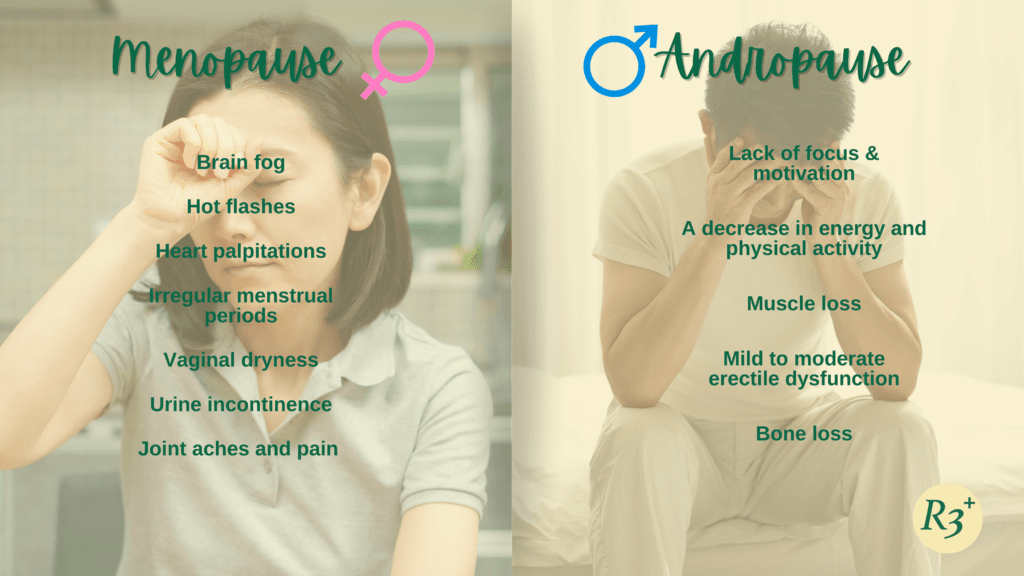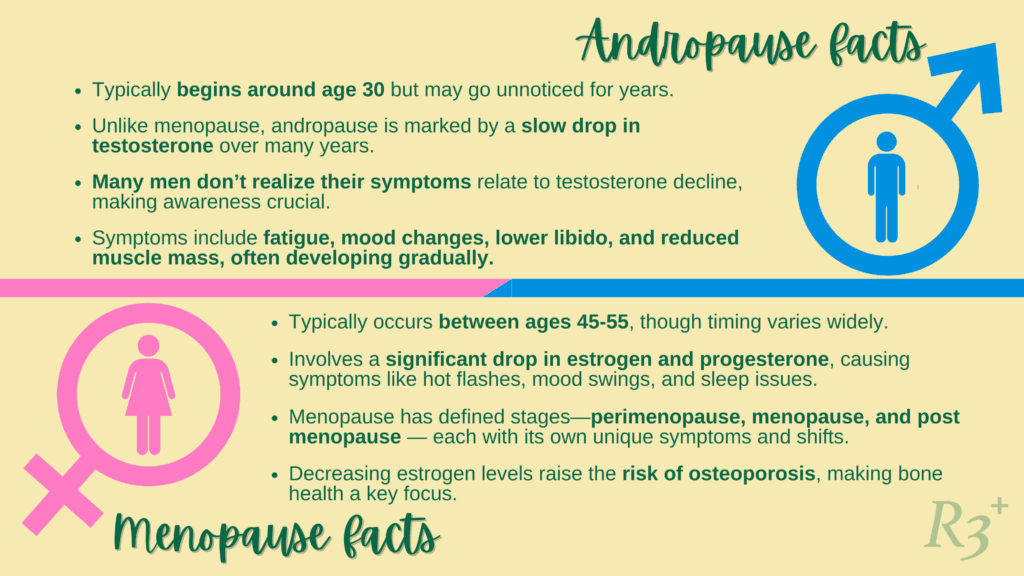Ever wonder if ‘Do men go through menopause’? – Yes! Men experience their own version of menopause called andropause, sometimes referred to as “male menopause.” Unlike women, men experience a gradual decline in testosterone, typically starting around age 30, which can lead to symptoms like low energy, reduced libido, mood swings, and muscle mass changes. Curious how this differs from menopause in women?
Keep reading to learn more about the difference between andropause and menopause and how NMN supplements can help manage these changes for both men and women!
Andropause and menopause
Women’s menopause follows clear stages: perimenopause, menopause, and postmenopause. Men, on the other hand, experience a slow, steady hormone drop without defined stages. Though symptoms like fatigue and mood changes appear more gradually, the journey can feel like a subtle hormonal rollercoaster! So, how does this compare between men and women?
Key Differences Between Andropause and Menopause
For women, menopause symptoms can be more intense and abrupt due to the sharp drop in estrogen and progesterone. Symptoms like hot flashes, night sweats, and joint aches are common. In contrast, men’s hormonal changes are slower, leading to a gradual onset of symptoms like fatigue, low libido, and mood changes.

Facts on midlife transition
- Hormonal Changes:
- Both transitions involve significant hormonal fluctuations. For women, estrogen and progesterone levels drop, while for men, testosterone levels gradually decline.
- Emotional and Psychological Effects:
- Both men and women may experience mood swings, anxiety, and depression during these transitions. Emotional health can be impacted similarly, leading to changes in relationships and social dynamics.
- Sleep Disturbances:
- Insomnia and sleep problems are common in both genders during these life stages, often due to hormonal changes, stress, or discomfort.
- Physical Symptoms:
- Both may experience physical symptoms such as fatigue, changes in libido, and weight gain. These symptoms can vary widely in intensity and duration.
- Potential for Lifestyle Changes:
- Both can benefit from lifestyle modifications like regular exercise, a healthy diet, and stress management techniques to alleviate symptoms and improve overall well-being.
- Aging Process:
- Both menopause and andropause are natural parts of the aging process, representing significant life transitions that can lead to self-discovery and personal growth.
Recognizing these shared experiences can promote empathy and understanding between genders as they navigate these changes.

During perimenopause, women can still get pregnant. You may be less likely to get pregnant, but it’s still possible. As long as you have a period, you can still get pregnant. Thus, it’s important to address this issue with your healthcare provider about your family planning
What Can Help?
Open discussions and lifestyle changes are essential. Practicing patience and empathy as partners and family can make a big difference. Small adjustments like a balanced diet, regular exercise, and even using calming practices, like meditation, can help ease symptoms.
NMN 250 supplements can also be transformative. With NMN, astaxanthin, and CoQ10, they support cellular health, boost energy, and reduce oxidative stress, helping both men and women manage symptoms like fatigue and inflammation during this transition.
Understanding these changes promotes smoother experiences and encourages open discussions about aging and health.
Why Supplements Are Especially Helpful for Women
Women’s symptoms often come on strong, with bone health, hot flashes, and mood swings demanding immediate care. Supplements such as calcium, vitamin D, magnesium, NMN, and CoQ10 support bone density, energy, and overall well-being, easing the intensity of menopause. Men benefit, too, though their needs may be less immediate.
Conclusion
Andropause and Menopause are natural, and with the right approach—including healthy habits and supplements like NMN 250—you can embrace this phase with energy, vitality, and even a little bit of fun! Consult your healthcare provider to explore the best strategies for this journey.







